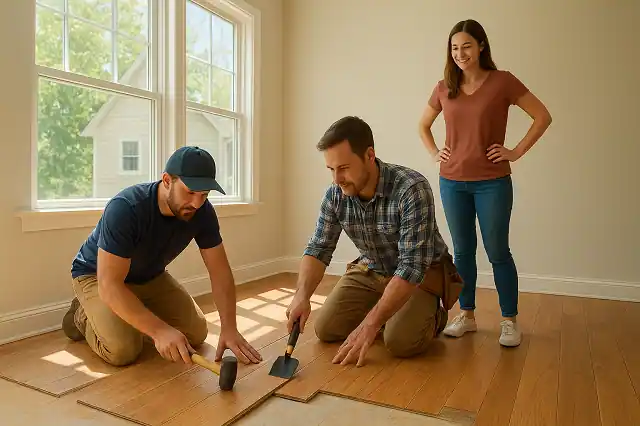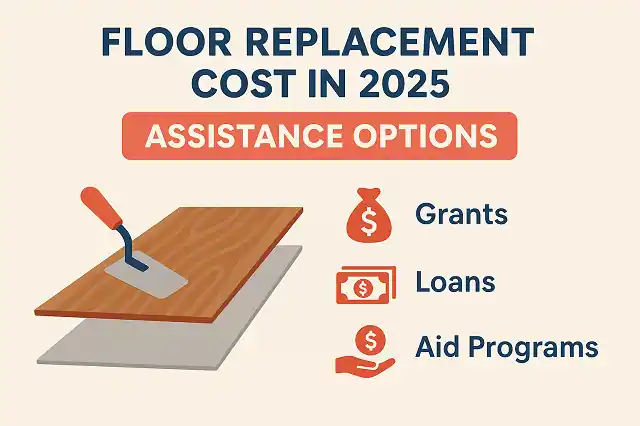One of the most crucial components of your house is the floor. It is the surface you walk on on a daily basis and has an impact on your home’s appearance, comfort, and safety. Numerous issues, including uneven walking surfaces, slips, and even mold if water leaks beneath it, can be brought on by a worn-out or damaged floor. In addition to making your house look better, floor replacement increases its value.
In 2025, however, the cost of home repairs, including replacing floors, has increased due to rising labor and material prices. The cost of new flooring may be prohibitive for many families, the elderly, and veterans. The good news is that programs, loans, and grants are available to help lower the cost.
This guide will outline the pricing factors of various flooring options, hidden costs, the average cost of replacing your floors in 2025, and financial aid programs that can help lower the project’s cost.
Average Floor Replacement Cost in 2025
The type of flooring, the size of your house, and your location all affect how much it costs to replace your floors. Here, however, is the overall range for 2025:
The average cost per square foot, including labor and materials, ranges from $6 to $18
500 square foot small house: $3,000 to $9,000
Home size (1000 square feet): medium: $6,000 to $18,000
2000 square foot large home: $12,000 to $36,000
Selecting high-end flooring options like solid hardwood, marble, or designer tiles may result in higher prices. However, the price can be kept low by using less expensive options like vinyl or laminate.
Important Elements That Impact Floor Replacement Costs
The following factors influence the overall floor replacement costs in 2025:
Material type: Hardwood costs more than carpet or vinyl.
Labor charges: State-by-state variations exist in worker wages. Urban areas typically have higher costs.
Read- Free Roof Replacement Grants For Veterans-State Specific Programs
The size of the house or room: Larger areas require more work and materials.
Removal of old flooring: Extra money is spent when removing tile or carpet.
Condition of the subfloor: You will need to have your subfloor repaired if it is damaged or uneven.
Finishing and design: Expensive finishes or unique patterns raise prices.
Flooring Options and Their Price Ranges in 2025
In 2025, homeowners have a wide range of flooring options. Every choice has a unique price, appearance, and lifespan.
- $10 to $25 per square foot for hardwood flooring.
Classic, durable, but expensive. Requires constant attention.
- Luxury Vinyl Plank (LVP) and vinyl: $4 to $10 per square foot
In kitchens and bathrooms, they are popular, reasonably priced, and waterproof.
- Laminate flooring costs between $5 and $12 per square foot.
Economical, long-lasting, and simple to install.
- Flooring with carpet: $3 to $8 per square foot
It is warm and soft, but it can get dirty and wear out easily.
- Ceramic and porcelain tiles range from $7 to $20 per square foot.
Sturdy and waterproof, but heavy and labor-intensive.
- Eco-friendly choices (recycled materials, cork, and bamboo): $6 to $15 per square foot
Stylish and environmentally friendly, but occasionally less robust.
Read- Top 8 First Time Home Buyer Grants- Programs and Freebies
Hidden Costs to Watch Out For
When creating your budget, you should also consider additional expenses that many people overlook:
$2 to $5 per square foot for leveling or subfloor repair
Disposal and removal of old flooring: $1 to $4 per square foot
Insulation and underlayment cost between $0 and $50 per square foot
$50 to $200 for delivery, depending on the distance.
$100 to $300 for permits (if required in some states). These unstated expenses have the potential to raise your overall bill by 10% to 20%.
DIY vs. Estimates for Expert Floor Replacement
Some choose to replace their floors themselves in an attempt to save money. However, is it actually less expensive?
Do-It-Yourself or DIY:
Only the materials are paid for.
The average price for vinyl or laminate is between $2 and $6 per square foot.
Good if you have the rudimentary tools and abilities.
Expert installation:
Labor and materials included.
Depending on the type of flooring, the average cost ranges from $6 to $18 per square foot.
Faster work, better warranty, and better finish.
Doing it yourself can save money in small spaces. Professionals are safer and might even end up saving money in the long run by avoiding mistakes on large or complex projects.
Grants and Financial Aid for Floor Replacement in 2025
It can be difficult for low-income families, the elderly, and veterans to afford new flooring. Fortunately, there are grants and aid initiatives in 2025:
Federal Initiatives
Low-income homeowners can improve their homes and make them safe and livable by applying for HUD Home Improvement Grants.
Rural homeowners can get assistance with necessary repairs, such as flooring, through USDA Section 504 Home Repair Grants.
Government-backed loans for home remodeling, including floor replacement, are available through FHA Title 1 Loans.
Read- Free Home Improvement Grants Assistance For Low-Income Veterans
Free Home Improvement Grants For Low-Income Seniors: Funding Options
Programs Specific to States
Home repairs are covered by housing programs in many states. In certain states, choosing eco-friendly flooring can result in energy-efficiency rebates.
Support for Veterans and the Elderly
Veterans with disabilities can receive assistance from VA Specially Adapted Housing (SAH) Grants to upgrade their home’s flooring for safety.
Senior Home Improvement Programs: To replace hazardous flooring, some local organizations offer grants or low-interest loans to senior citizens.
Read- Free Window Replacement For Senior Citizens: Costs and Grants Updated
Nonprofit and Charitable Assistance
Affordable home repairs, occasionally including flooring, are provided by Habitat for Humanity.
Rebuilding Together: Assists veterans, seniors, and low-income families with important home repairs.
Loans and Additional Sources of Funding
If grants are not available to you, loans and financing could be helpful:
Flexible-term home improvement loans are provided by banks and credit unions.
FHA Title 1 loans: easier to qualify for, government-backed.
Although personal loans are unsecured, they may have higher interest rates.
If you can make quick payments, credit cards with a zero percent annual percentage rate are good for short-term financing.
Flooring company financing plans: A lot of flooring retailers now provide options for monthly payments.
Ingenious Methods for Cutting Costs in Floor Replacement
You can reduce your expenses even if you do not receive full financial aid by making wise plans:
Select reasonably priced materials: vinyl and laminate are both reasonably priced and fashionable.
Buy off-season or during sales: Winter and holiday sales are when prices are lowest.
Invest in bulk purchases to take advantage of frequent discounts.
Reuse or recycle old flooring: Subflooring and trim can occasionally be put to new uses.
Combine with other remodeling projects: Contractors might offer discounts for several projects.
Examine eco-rebates: Certain states offer rebates for flooring made of recycled materials bamboo or cork.
Conclusion
In 2025, floor replacement is a significant investment in the security, comfort, and value of your house, but it is not inexpensive. For medium-sized homes, homeowners should budget between $6,000 and $18,000 on average, depending on labor costs and flooring type.
But you do not have to pay for everything by yourself all the time. Floor replacement can be made more affordable through a variety of sources, including nonprofit organizations, VA programs, senior assistance, federal and state grants, and financing options.
You can replace your floors without going over your budget if you plan, look into financial aid, and select the appropriate materials.
You can have a comfortable and safe floor in your house by 2025 if you get the right assistance.